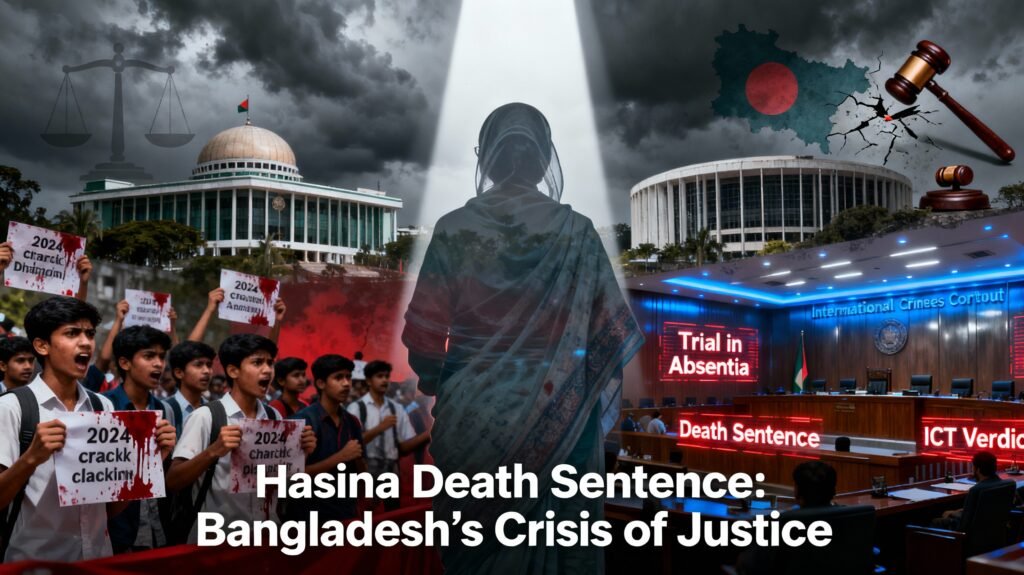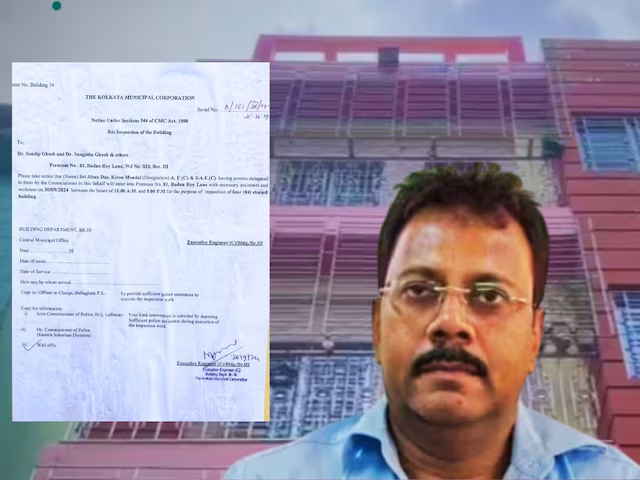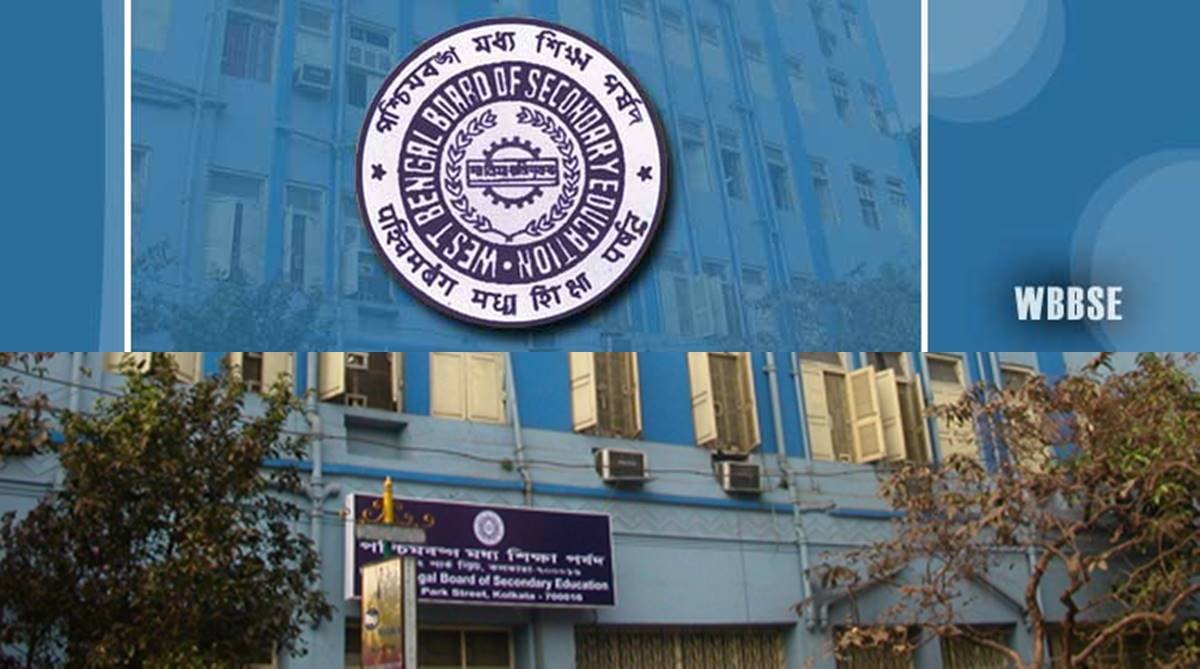International Crimes Tribunal Faces Credibility Crisis After Controversial Death Sentence for Sheikh Hasina
Background: From the 2024 student uprising to the fall of Sheikh Hasina’s government to the International Crimes Tribunal
In July and August 2024, Bangladesh experienced an unprecedented wave of student-led protests that rapidly escalated into what many observers described as a mass political uprising. What began as demands for reform of job-quota allocations in the civil service soon morphed into a broader anti-government movement. By some official figures, more than 800 people were killed and about 14,000 wounded; a February 2025 UN rights report estimated the death toll could have reached up to 1,400.
Under mounting pressure, the long-time Prime Minister Hasina—who had served continuously since 2009 and whose party Bangladesh Awami League (AL) dominated politics—was forced to step down. Her government was replaced by an interim or caretaker regime headed by Muhammad Yunus (Nobel laureate) that took over in August 2024. The parliament was dissolved, elections were postponed, and the Awami League was barred from participating in the forthcoming polls.
Meanwhile, Hasina fled into exile in India. In the months following her departure, a sweeping set of investigations was launched against her and senior AL figures for alleged crimes committed during the crackdown on the protests. On 1 June 2025, the domestic tribunal known as the International Crimes Tribunal (Bangladesh) (International Crimes Tribunal-BD) formally indicted Hasina on charges of crimes against humanity, including incitement, conspiracy, failure to prevent mass killings and ordering the use of lethal force (including drones/helicopters) against unarmed student-protesters.
On 17 November 2025, the court delivered its verdict: Hasina was convicted in absentia, sentenced to death for the crackdown, and also handed a life sentence under an alternate charge.
Legitimacy of the International Crimes Tribunal-BD: Domestic tribunal with “international” trappings

It is critical to understand the institutional nature of the International Crimes Tribunal-BD to assess the legitimacy of the verdict and the tribunal itself.
Origins and mandate
The International Crimes (Tribunals) Act, 1973 (ICTA) was enacted by the Bangladeshi parliament soon after independence, originally to address atrocities committed during the 1971 Liberation War (genocide, war crimes, crimes against humanity) via domestic special tribunals. The International Crimes Tribunal-BD as we know it, was established under the ICTA beginning in 2009 (under Hasina’s own government) to prosecute those alleged to have collaborated with the Pakistani army and committed crimes in 1971. Thus, although its name contains “International Crimes”, the tribunal is a domestic Bangladeshi institution, created by Bangladeshi legislation and staffed entirely by Bangladeshi judges and prosecutors. It is not a treaty-based international court subject to multilateral oversight, unlike the International Criminal Court (ICC) or the International Court of Justice (ICJ), which derive their authority from international treaties and the consent of multiple states.
International vs domestic: major distinction
The ICJ’s mandate, for instance, rests upon the Statute of the International Court of Justice (an integral part of the UN Charter) and provides for binding disputes between states, elected judges from various countries, as well as a multilateral legitimacy. Other international criminal tribunals (e.g., the ICC) similarly require ratification of the Rome Statute and adhere to strict due-process protections recognised globally. The International Crimes Tribunal-BD, in contrast:
- is created by Bangladeshi domestic law (ICTA 1973), amended over time in Dhaka.
- has no international judges, no independent global oversight body, and its decisions are not subject to appeal before a multilateral court.
- functions within the Bangladeshi constitutional and legal system, and its mandate can be amended by the national parliament, as indeed recent reforms show (for example, an amendment in 2024 broadened its jurisdiction).
Legal scholars have therefore described the International Crimes Tribunal-BD as a “quasi-legal” or “domestic judicial platform” rather than a genuine international court. For example, in The Diplomat, one article titled “Bangladesh’s International Crimes Tribunal’s Legitimacy Under a Cloud” argued that:
“The quasi-legal International Crimes Tribunal … has been plagued by allegations of judicial missteps, shortcomings, and a failure to stand the test of international judicial standards.” The Diplomat
Due process concerns and trial in absentia
One of the most contested features of the tribunal’s recent practice is its use of trials in absentia. Under section 10A of the ICTA (added in 2012), International Crimes Tribunal-BD may proceed if the accused is absent—provided certain conditions (such as publication of notice) are met. Yet commentary warns that such provisions fall short of the safeguards recognised under international human-rights instruments (for example, the UN Human Rights Committee’s and the European Court of Human Rights’ jurisprudence on the right to be present at trial). The blog EJIL-Talk notes:
“The provision allowing in absentia trials does not grant the right to a retrial or effective presence required under ICCPR and other standards.” EJIL: Talk!
Moreover, the tribunal has been criticised for limited defence rights, rapid judgment delivery, and the death penalty, where international due-process norms generally disfavour capital punishment when trial standards are weak.
Conclusion on legitimacy
In sum, while the International Crimes Tribunal-BD is formally empowered under Bangladeshi law to try “international crimes” (juxtaposed to domestic crimes), it remains fundamentally a national tribunal. It lacks the treaty-based multilateral legitimacy, cross-border oversight, or standard international embedding of courts such as the ICJ or ICC. That distinction matters, especially when assessing fairness, transparency and political independence.
The fact that the tribunal is being applied to a sitting (now ex) prime minister in a highly politicised environment only heightens these concerns.
Reactions: legal experts, human rights organisations and political actors
Hasina’s and Awami League’s reaction
Hasina immediately rejected the verdict, stating in a written submission that the proceedings were politically motivated and that the tribunal was “a rigged tribunal” presided over by an “unelected government with no democratic mandate.” Her party, the Awami League, maintains that the charges and trial were engineered to neutralise political opposition and recast the student-uprising narrative. For example, former Home Minister Asaduzzaman Khan Kamal (also sentenced to death) told India Today:
“We knew this verdict would come. This court was formed to finish Awami League leadership … This is an illegal court.” India Today
International and human-rights reactions
The United Nations Office of the High Commissioner for Human Rights (OHCHR) said it “regrets the imposition of the death penalty” in the Hasina case and emphasised that accountability proceedings involving alleged international crimes must “unquestionably meet international standards of due process and fair trial” — especially when trials are in absentia.
Legal scholars and policy analysts have been forthright. As per The Diplomat:
“Due legal process and international involvement will ensure credibility of Bangladesh’s contested judicial platform.” The Diplomat
Another commentator (on EJIL-Talk) flagged the trial-in-absentia aspect, saying that while the ICTA allows it, the provision falls “well short” of the international benchmarks for an accused to be present or to have the possibility of a later retrial.
Collective summary
- Supporters of the verdict (particularly within Bangladesh’s interim government) welcome the decision as evidence that “no one is above the law”.
- Critics argue that due to the tribunal’s domestic nature, absence of meaningful international oversight, and the political context of the case, the process falls short of what credible international criminal justice would require.
- The verdict in absentia, immediate sentencing, and the linkage between the tribunal and electoral exclusion of the AL have intensified concerns that the judicial instrument is being harnessed for political ends.
Political motivations and the broader context
The timing and mechanics of the trial cannot be divorced from the political context. The interim government—led by Muhammad Yunus—came to power in the wake of the 2024 uproar and has banned the AL from upcoming elections (scheduled for early 2026).
Analysts point out several features that suggest political motivations:
- The amendment to the ICTA in September 2025, flagged by The Diplomat, introduced a provision barring anyone charged with “crimes against humanity” from contesting elections or holding public office. This was widely seen as targeting AL leadership.
- The tribunal was originally designed for the 1971 war-crimes context; its extension to the 2024 crackdown raises questions about selective retro-application or widening of scope to suit the new regime’s agenda. (The L’ Monde article remarks that the tribunal “was reconstituted specially for this occasion” of trying Hasina).
- The prosecution was able to secure leaked recordings, drone/ helicopter evidence, and statements in a relatively compressed timeline—circumstances suggestive of a drive for swift punishment ahead of elections.
From Hasina’s perspective:
“In their distasteful call for the death penalty, they reveal the brazen and murderous intent of extremist figures within the interim government to remove Bangladesh’s last elected prime minister, and to nullify the Awami League as a political force.”
From the interim government’s side:
The verdict “recognises suffering of the student protesters” and confirms that Bangladesh’s justice system will hold perpetrators accountable.
Thus the trial functions as both a legal accountability process and a political instrument, one aimed at reshaping Bangladesh’s power framework ahead of elections.
The verdict has also been perceived by many as signalling that a domestic “international crimes” court can be used instrumentally:
Domestic and international reception
Domestically, there were scenes of celebration outside the tribunal: families of protest-victims cheered, sweets were distributed in Dhaka University, vehicles and bomb incidents occurred in the run-up to the verdict, indicating heightened tension. Internationally, India issued a measured statement:
“As a close neighbour, India remains committed to the best interests of the people of Bangladesh … We will always engage constructively with all stakeholders.”
Meanwhile, human-rights bodies emphasised the need for fair process, cautioning that the death penalty in this context could undermine the legitimacy of the judgment and of Bangladesh’s justice system more broadly.
Probable fallout: unrest, political control and the shadow of past crackdowns
Risk of nationwide unrest
The verdict comes ahead of elections (scheduled for February 2026), from which the AL has been banned. The sentencing of its leader, along with other top figures, risks sparking a revival of protest, civil unrest and possibly violent backlash. Indeed, in the days before the verdict, at least 30 crude bomb explosions and 26 vehicles were torched across Bangladesh. The broader pattern suggests that the verdict may act as a focal point of contention, provoking destabilisation at a time when the interim government is still consolidating control.
Implications for the interim government’s control
For the interim government of Muhammad Yunus, the verdict sends a strong message: it controls not only politics and the electoral rules but also the machinery of accountability. By delivering a dramatic sentence against a former longstanding leader, the regime underscores its dominance and signals to opposition forces that legal punishment, not just political marginalisation, awaits them. That said, heavy-handed tactics carry the risk of undermining the very legitimacy that the interim government claims to uphold—especially if fairness is widely questioned internationally.
Historical comparisons: past crackdowns under Hasina
It is worth recalling that under Hasina’s 15-year rule, critics accused her of suppressing dissent, curtailing press freedom and using security agencies to eliminate opposition. The 2024 protests were the most dramatic challenge to her authority. Scholars and rights groups have drawn parallels: now that the former government is being prosecuted by a tribunal she once empowered, the situation reflects how cycles of crackdown and counter-crackdown embed themselves in Bangladesh’s politics. The verdict thus marks not only a legal moment, but a crystallisation of ongoing crises in governance, accountability and the rule of law.
Conclusion: What this means for Bangladesh’s judiciary and the rule of law
The conviction and death sentence of Sheikh Hasina by the International Crimes Tribunal-BD is a watershed moment in Bangladesh’s political and legal history. Yet its broader implications are ambivalent.
- On one hand, the decision may be seen as a long-overdue accountability measure for massive state repression. If the tribunal’s evidence is credible, victims may finally have some redress, and Bangladesh’s impunity culture could face a reckoning.
- On the other hand, the legal context—an absent accused, a tribunal lacking multilateral legitimacy, embedded in a political transition where one party is banned—raises serious questions about the integrity of the judgment and whether justice is being served or deferred for political ends.
- For Bangladesh’s judiciary, the message is troubling: when domestic “international” courts become instruments of the state rather than autonomous guardians of rights and due process, the sanctity of legal processes (and public confidence in the rule of law) is eroded. The use of the death penalty in such a context further deepens the risk of human-rights backlash and international isolation.
- For the region and for international observers, the case underscores a key lesson: labels matter. A court called the “International Crimes Tribunal” may sound like it carries global legitimacy—but absent the treaty foundation, multilateral composition or oversight characteristic of true international courts, it remains a national court. If politically captured, it may become a mechanism for marginalising opponents under the guise of global justice.
In that respect, the Hasina verdict is both an end and a beginning—an end to her era of governance and a beginning of a new chapter in Bangladesh. Whether that chapter will be one of genuine accountability, strengthened rule of law and democratic or draconian renewal—or one of continued politicised justice, weakened institutions and suppressed opposition—remains to be seen. The credibility of Bangladesh’s justice system, its ability to conduct fair trials, and its capacity to manage political dissent within the rule of law rather than outside it, are now on trial themselves.
Sheikh Hasina death sentence, Bangladesh ICT verdict, International Crimes Tribunal Bangladesh, Bangladesh political crisis 2025, Hasina trial in absentia, Awami League crackdown case, Bangladesh rule of law crisis, Sheikh Hasina conviction, Bangladesh human rights violations, Muhammad Yunus interim government
Discover more from
Subscribe to get the latest posts sent to your email.










